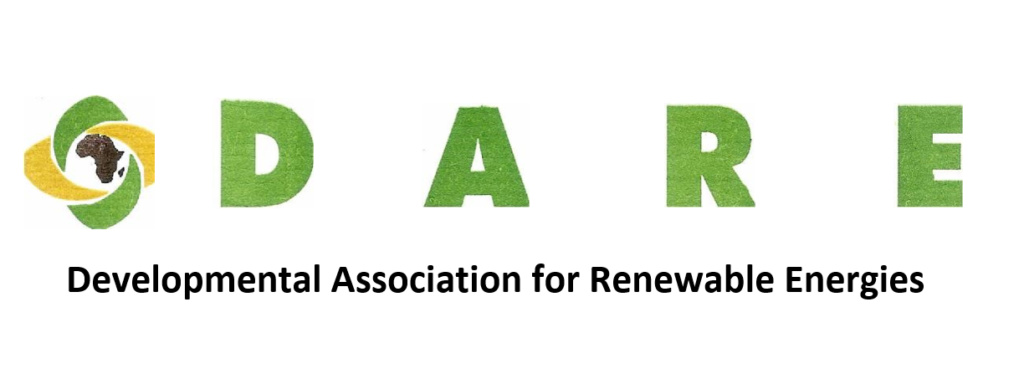A GCAP UNFCCC – Registered Initiative.
About The Project
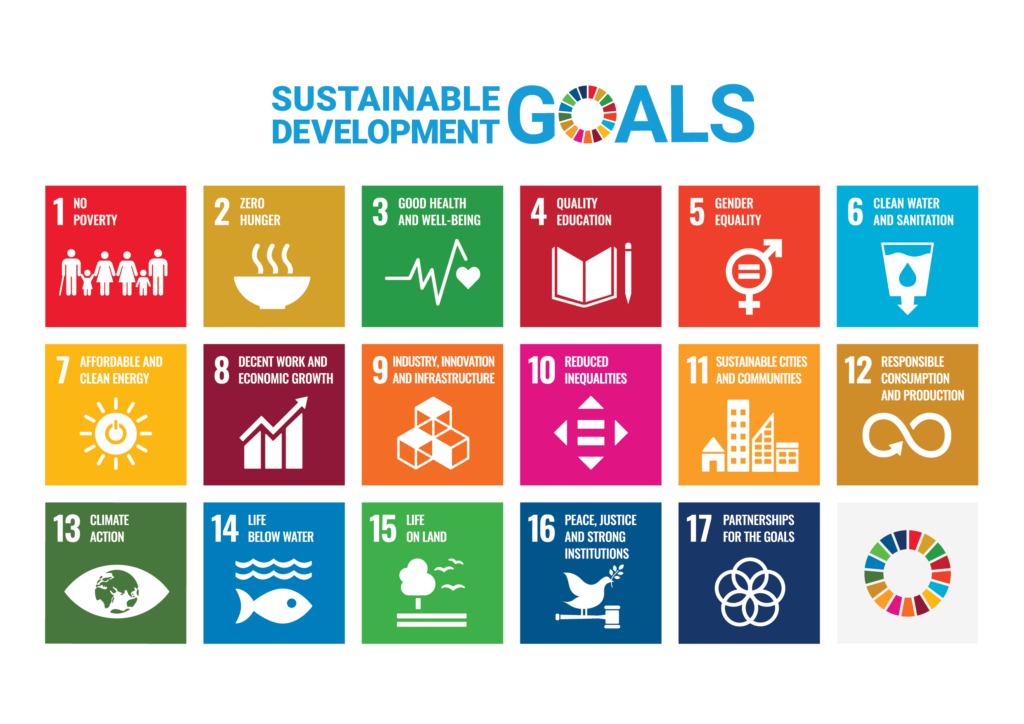
Goal description
Deforestation and desertification have become a major concern in Nigeria, as wood demand for heat energy both for household and commercial purposes largely exceeds the available renewable woody biomass. The key objectives and components of the Initiative include:
a) Cookstoves Distribution – distribute 80 million highly efficient cookstoves to low-income and poor families across Nigeria for free, aiming at drastically reducing the level of traditional firewood consumption during cooking to over 80%; the target population is found primarily in rural areas where fuelwood is the dominant energy source (over 70%);
b) Tree Planting Commitment – recipients commitment, each recipient agrees to plant 50 seedlings of commercial trees, resulting in 4 billion trees planted at the end of the project (National Innovative Tree Planting Programme for Poverty Reduction); the aim is to provide the seedlings free of charge for woodlots at the same time as the cookstoves.
The implementation phase starts date is June 2024. The Improved cooking system will save more than 80% of fuel wood. By reducing the fuel wood consumption, the Initiative hence reduces deforestation and greenhouse gas emissions stemming from the use of non-renewable biomass. A single cooking system will save 5.5 t of CO2e per year.
Alignment to Paris Agreement
The Initiative aligns with the Paris Agreement by contributing towards the goal of mitigating climate change and achieving sustainable development. The Initiative helps to reduce greenhouse gas emissions and other air pollutants, which are significant contributors to climate change. By reducing the use of traditional stoves and replacing them with cleaner cookstoves, the Initiative can provide a more sustainable solution to cooking needs and reduce deforestation, which enables more carbon to be stored in trees.
The Initiative contributes to maintaining a sustainable climate by reducing carbon emissions from the initial stages of production to end-use and waste disposal. The project works by introducing and promoting the use of cleaner and energy-efficient cookstoves, which significantly decrease the amount of fuel used and the amount of greenhouse gases emitted during cooking. Moreover, by reducing the amount of wood required for cooking, the project helps to slow deforestation, which is one of the significant contributors to climate change.
Sustainable sourcing of the raw material for the project could result in carbon sequestration and increased biodiversity. The Paris Agreement set a target of keeping global temperature rise below 2 degrees Celsius while pursuing efforts to limit it to 1.5 degrees Celsius. The project directly contributes to the Paris Agreement’s goal of achieving the 1.5-degree target by reducing carbon emissions and deforestation. By harnessing the initiative’s potential impact on the environment and raising awareness on the benefits of using clean cookstoves, the Initiative can empower communities to transition to sustainable energy use, which is essential for achieving the Paris Agreement’s ambition.
Alignment with global goals
Sharm el Sheik; Adaptation Agenda Break through; Agenda 2030 Breakthroughs; Marrakech Partnership; Climate Action Pathways REDD+: Fuelwood Efficiency: Reduce reliance on fuelwood with efficient cookstoves, addressing SDG 7 (Affordable and Clean Energy). Reforestation Commitment: Each recipient commits to planting 50 trees, contributing to SDG 15 (Life on Land) and SDG 13 (Climate Action).
Holistic Impact: Social Empowerment: Elevate low-income families (in the selected pilot States) by providing them with 10 million cookstoves for free and the means to sustainably generate income through woodlots; Ecosystem Restoration: Combat desert encroachment in the North and deforestation in the South, fostering environmental resilience.
Long-term Co-benefits: Sustainable Livelihoods, families gain new income streams through tree cultivation; Biodiversity Conservation, promote a diverse range of commercial trees for long-term ecological balance; Community Resilience, strengthen communities against climate change impacts through sustainable practices; Bringing wood consumption down to allow natural recovery of forests and/or reforestation to take place; Diminish Indoor Air Pollution from wood smoke and avoid its harmful health consequences; Diminish the huge fuel wood bill for households; Enhancing technology transfer, skill acquisition, job creation, gender equality, affordable and clean energy; Preserve wood resources to avoid inter-communal and/or inter-religious conflict over resources.
Study:
Monitoring
Monitoring arrangements in development:
The improved efficient stoves project is a critical initiative that requires effective monitoring to ensure its success. Developmental Association for Renewable Energies and Greenplinth Carbon Limited, in collaboration with local stakeholders and participants, are managing the project monitoring procedures. Establishing monitoring procedures and methodology that are designed to deliver on set targets. This includes identifying the development indicators that the initiative seeks to impact and specific set targets that are documented and shared with every participant.
The Initiative has an independent monitoring and evaluation team that is responsible for data collection, analysis, and reporting on progress. The team is not involved in the project’s implementation to avoid any bias. There are also feedback mechanisms in place for stakeholders to provide feedback on the Initiative’s progress and potential bottlenecks and offer recommendations on how to improve the project. Data Collection Process: Data Loggers (Manual in the first instance and subsequently Devices) for physical data collection from households.
Data such as but not limited to temperature, heat flux, motion, or pollutant concentrations. Stove use monitors (SUMs) use one or more of these measurements to estimate stove use and/or energy consumption. Capturing data on progress includes setting up a performance monitoring database system that captures data on the number of households that have been reached, the number of cook stoves produced and distributed, change in cooking methods and their impact on indoor air quality, income levels of beneficiaries, and more.
Timelines and Reporting Cycles: The timelines are 30 to 60 days because of the difference in geographical boundaries and locations. The reporting cycles are quarterly (not more than 90 days per cycle) to ensure regular monitoring of the project. This ensures that data is captured on an ongoing basis and shared with stakeholders in a timely manner. The reporting cycles are equally communicated to all stakeholders at the beginning of the project.
Deliverables & output
Key achievements and success stories
Up to now, highly efficient woodstoves with savings of more than 80 % are not available in the country.
The Panda Clean Cookstove is a mobile stove developed and prefabricated by a German manufacturer and assembled locally in Nigeria. It has a nominal effective thermal power of 4.5 kW.
As per specification by the manufacturer, it needs only about 0.25 Kg of small sticks of wood to bring 6 litres of water to the boil, more than 80% less than traditional fireplaces.
On one side at the base of the device, there is a cylindric port for feeding fuel wood into the burning chamber. After lighting, air is sucked in and enters the burning chamber from below.
The design ensures preheating of the air and a complete combustion with no visible smoke and only small amounts of ash. Exhaust air outlet is provided by a chimney on the side opposite the feeding port.
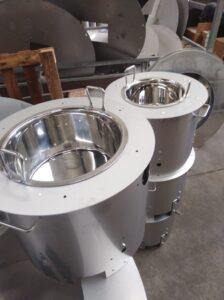
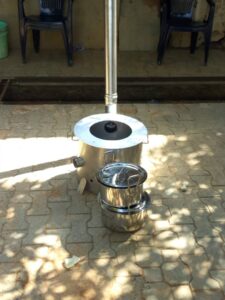
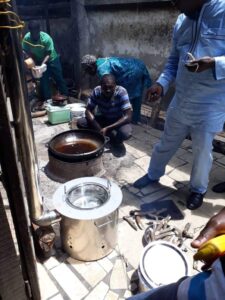

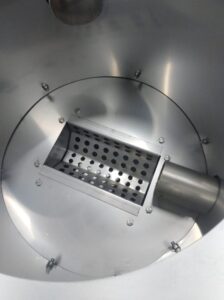

Challenges & opportunities
Key Challenges
Cost of production is very high for the quality of the initiative with limited opportunity for traditional financing.
Key opportunities
Carbon Finance opportunities.
Lead organization:
GREENPLINTH AFRICA LIMITED
9, Gbade Olayode Close, Ajao Estate, Off International Airport Road, Lagos, Nigeria.
Organizational Structure:
A consortium of strategic partners including:
GREENPLINTH AFRICA LIMITED, NUMERIX DEVELOPMENT LIMITED, DEVELOPMENTAL ASSOCIATION FOR RENEWABLE ENERGIES and GREENPLINTH CARBON LIMITED.
Other Partners and Strategic stakeholders.
Contact Persons:
Dr. Olawale Akinwumi
olawaleakinwumi @ gmail. com
Dr. Victor Fodeke
vicfodeke @ gmail. com


